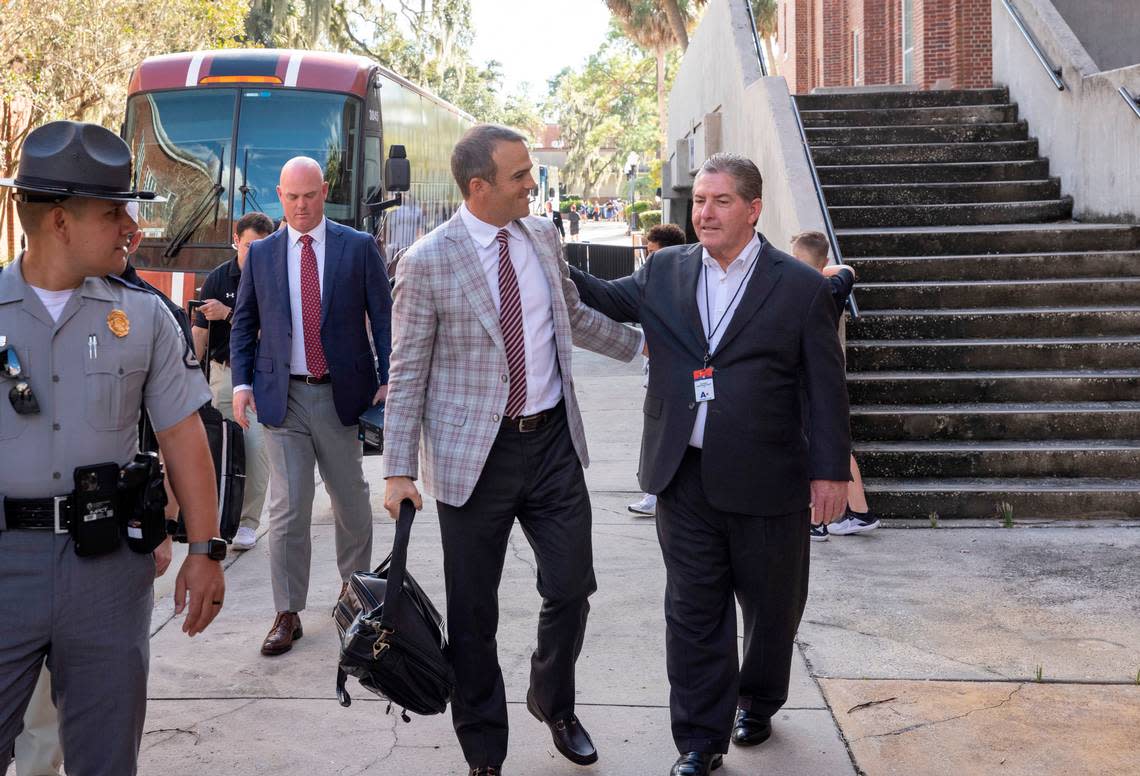South Carolina, SEC school officials to visit Washington, D.C., in NIL lobbying effort

- Oops!Something went wrong.Please try again later.
South Carolina reps and the Southeastern Conference are heading to the nation’s capital.
USC athletic director Ray Tanner told The State on Thursday he, football coach Shane Beamer and women’s basketball coach Dawn Staley are heading to Washington, D.C., next week to visit with representatives about potential name, image and likeness legislation.
The South Carolina contingent is expected to be joined by representatives from all 14 SEC schools, including athletic directors, basketball and football coaches.
“I’m a proponent of (NIL),” Tanner told The State on Thursday at SEC spring meetings. “If your son or daughter is not an athlete, they have an opportunity to monetize off their names and likeness. Why should we prohibit an athlete doing the same thing? ... But we all know that there are certain parts of NIL that are not great right now.”
The trek to D.C. is the latest step in college sports’ ongoing fight to find a level of standardization in NIL rules and enforcement nationwide and amid deep conversations on the subject this week in Florida during the SEC’s annual spring meetings.
The NCAA ruled in 2021 student-athletes could begin to profit off their names, images and likenesses in a colossal shift from the amateur model that had governed college sports for decades. That, however, has evolved into fracturing among states in regard to what universities in those areas are and aren’t allowed to do and varying local laws that create competitive imbalance.
In South Carolina, for example, the state legislature passed a law in April 2021 that put guidelines in place to limit the scope of what kind of NIL activities universities were allowed to partake in. That law was then suspended in July 2022 because it created competitive disadvantages for USC, Clemson and other university athletic departments, among other issues.
That suspension now leaves South Carolina without any rules regarding what state institutions can or can’t do NIL-wise, outside of what NCAA rules allow.
Tanner noted part of the the plan is to visit with representatives from South Carolina in addition to a reception that will include lawmakers from the SEC footprint and athletic department staffers that make the trip.
Added Tanner: “There’s a lot to be decided. Will Congress eventually put some guardrails in place with NIL? We’ll see. They’ve got a lot on their plate. They’re probably not sitting around just waiting for us to roll in there next week. But we’re coming. We’re gonna be there.”
NIL has also come under fire in regard to collectives — third-party organizations used to compile funds that are then divvied up to college athletes for varying endorsement deals — and how they’ve allegedly added a pay-for-play model to college athletics.
NCAA rules currently stipulate NIL money and deals are not supposed to be used as inducements in the recruiting process. That said, cries from athletic directors and coaches, particularly in football, have become more commonplace.
Just last summer, Alabama coach Nick Saban came under fire for comments he made about Texas A&M head coach Jimbo Fisher and the No. 1 recruiting class the program signed. Beamer, too, has been a staunch critic of the evolution of pay-for-play NIL deals in recent months and throughout his recent visits with booster clubs around South Carolina.
“Nobody’s trying trying to take away name, image and likeness. Nobody’s trying to take away the transfer portal,” Beamer told The State on Wednesday. “But I think everybody’s in agreement — when I say ‘everybody,’ leadership within college athletics — that there just needs to be more guardrails, if you will, and a little bit more regulation than what there is right now, potentially.”
SEC commissioner Greg Sankey noted the challenges facing the league regarding NIL and the fractured way in which it’s governed during a lengthy address at the league’s media days in July 2022.
“It’s a difficult issue, subject to the onset of state laws that came into effect last July, and since that time some of those same states have pulled back from those laws because it’s in the state’s competitive interest to do so,” Sankey said at the time. “It’s exactly what we warned about dating back to 2019; that a patchwork of state laws was the most ineffective way to approach name, image and likeness.
“Here is our view. We need a clear, enforceable standard to support national championship-caliber competition, and national championships themselves, like the College World Series, the Final Four, the College Football Playoff national championship, and every other national championship, so there is a connection and a common basis for competition.”
Tanner said he’s hopeful legislators will take up the cause and he’s optimistic there’s interest in helping college sports come to some level of resolution on the issue.
The timeline for any kind of actual congressional action, though, is still to be determined.
“Will we go up there on Wednesday, and roll out something exciting for Thursday and Friday? Doubtful,” Tanner said through a slight laugh. “But I think it’s an important trip.”

